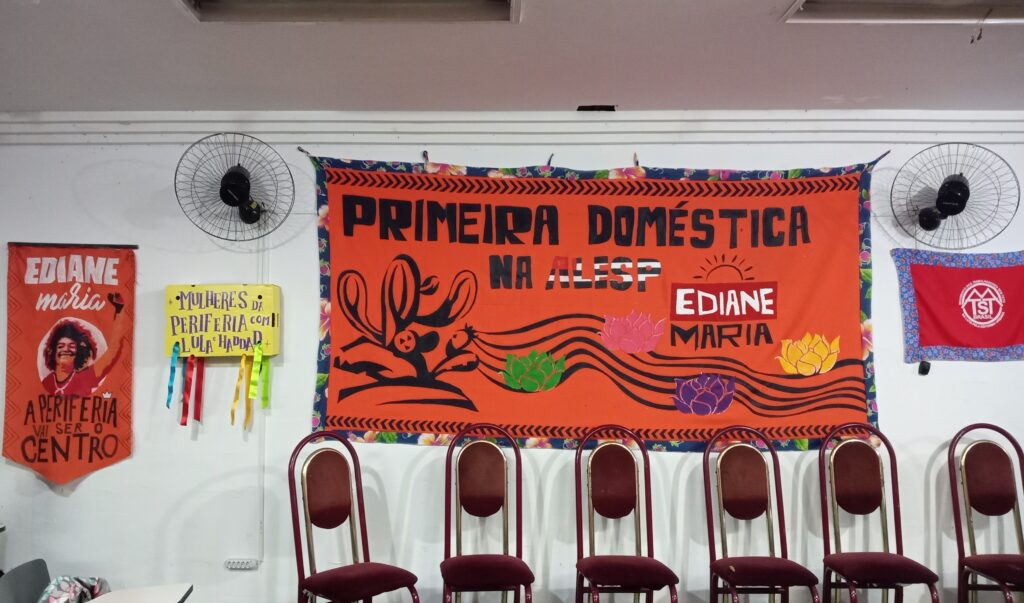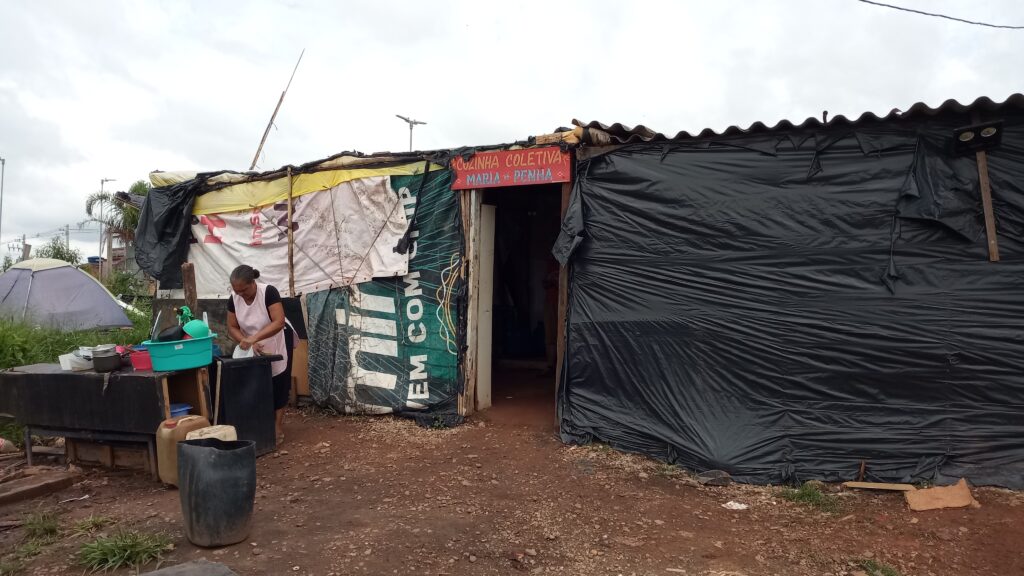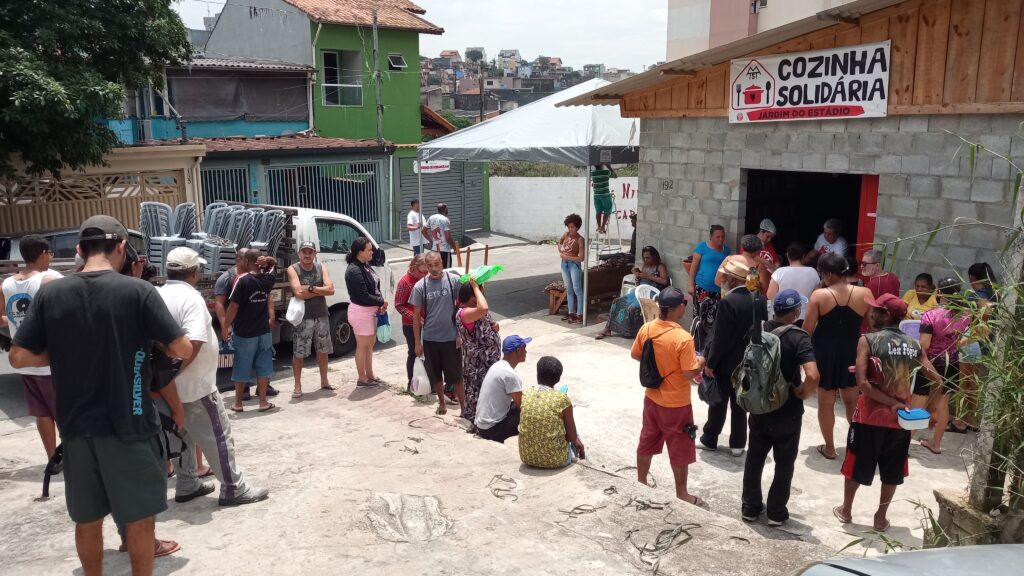On 30/10/2022, Luiz Inácio Lula da Silva (Lula) of the Workers’ Party won an exceptionally close runoff election against the current far-right president of Brazil, Jair Messias Bolsonaro. For volunteers of a community kitchen (Cozinha Solidária) of the leftist Homeless Workers Movement (MTST), Lula’s victory represents an enormous relief and a hope after the long period of anxiety during the election campaign. Nevertheless, his victory does not mean “the end of hell or the entrance into paradise”, as Maria (all names are pseudonyms), one of the volunteers cooking in a Cozinha Solidária noted.
The hell she speaks of means the years of the Bolsonaro government, in which almost 700,000 people in Brazil died of Covid-19, while the president made jokes about patients with respiratory distress. Hell, moreover, means the hunger that the women themselves experience and fight in their volunteer work. In recent years, Brazil has returned to the world hunger map of the United Nations. According to the Brazilian Research Network on Food and Nutritional Sovereignty and Security, circa 30% of Brazilian households are currently food insecure. In addition to the Covid-19 pandemic, suspension of state welfare programs, inflation and price increases have led to this development. The aftermath of this period will not be over when Lula takes office early next year.
Hell and paradise are metaphors that reflect the volunteer’s worldview, which is strongly influenced by the Christian system of belief. The all-female chefs of the Cozinha Solidária where I conduct ethnographic fieldwork since March 2022 regularly frequent Catholic or Evangelical churches. Besides that, the women are also part of the political struggle for housing in demonstrations and occupations of urban land. In their everyday lives, they balance left-wing political militancy and religiosity. They are politicized through the social movement and entrenched in their peripheral community. All the kitchen’s volunteers working there currently are also mothers and most of them work or worked in paid cleaning jobs in addition to their volunteer work.
In this article, I portray the period between the first round of voting on 2/10/2022 and the runoff. How did the cooks negotiate the fear of a second electoral victory by Jair Bolsonaro? A look at the Cozinhas Solidárias sheds light on the positioning of hunger and domestic labor within the election campaign. The perspective of the cooks’ stresses the importance of religiosity to people’s lives and political decisions. After localizing the Cozinhas Solidárias within the Homeless Workers Movement and explaining their emergence and functioning, I consider reflections and concerns about the election, starting from the perspective of the cooks, to arrive at an assessment of the consequences of the election results.
Cozinhas Solidárias of the Homeless Worker’s Movement
The Homeless Workers Movement (MTST) was officially founded in 1997 as the urban counterpart of the rural reform movements of the Landless Workers Movement (MST). The first occupation took place in Campinas, a city close to São Paulo. Nowadays, the MTST is present in 13 Brazilian states, but most occupations are still concentrated in and around the city of São Paulo. The strategy of the movement is to occupy unused land in the periphery of large cities and to obtain expropriation with reference to the legally established duty of fulfilling a social function of the inner-city areas.
Victor Albert traces the history of the movement: In the first decade after its founding, it had little success with the strategies of the Landless Workers Movement. This changed, on the one hand, because of social mobilizations during the housing market crisis and the 2013/2014 World Cup, and on the other hand, primarily through cooperation with the Lula government’s state housing program Minha Casa Minha Vida. The movement was often able to obtain home ownership for the squatters through the State Program and thus acted as an agenda for identifying new building land for the state program.
During Jair Bolsonaro’s administration, which replaced the Minha Casa Minha Vida program with the Casa Verde e Amarelo loan program and classified the MTST as terrorism, their construction projects from the Minha Casa Minha Vida era continued to be completed, such as 216 apartments in São Paulo’s West Zone in March 2021.
The idea of Cozinhas Solidárias was already inherent in the community kitchens that are part of every land occupation of the movement. The occupations of new land areas begin with the construction of tents made of tarpaulins and bamboo. In newly emerged occupations, community kitchens are the first shanties to be set up to nurture the squatters and provide a place of political organization and community economy. Each occupation has numerous of these kitchens, which are the heart of the groupings, the small neighborhoods within the barrack settlements. The kitchens inside the squats are primarily for the squatters who run and finance them.
What is new about the Cozinhas Solidárias is that they now address the peripheral neighborhoods outside the occupations. Diverse people from the nearby neighborhoods frequent the cozinhas solidárias, for example schoolchildren, old people, or workers at their lunchbreak. They pick up hot lunches for free that were prepared and distributed by volunteers like the women mentioned in the beginning of this article. The Cozinhas Solidárias acquire their donations in the form of money from large-scale campaigns and as crops by collaborations with, for example, supermarkets and the MST. Cozinha Solidarias’ dependence on food has brought the MST into close contact with its urban counterpart.
The Homeless Workers Movement founded the first Cozinha Solidária in São Paulo in March 2021, during the peak of the Covid-19 Pandemic, under the motto highlighted by MTST coordinator Guilherme Boulos, “we do what the government does not“. The movement now operates 31 of these kitchens throughout Brazil. By expanding to peripheral neighborhoods in general, the movement claimed a direct confrontation of the cutbacks in state welfare programs under the Bolsonaro government.
Hunger was particularly central to Lula’s election campaign, highlighting how his earlier government had helped to remove Brazil from the United Nations world hunger map, on which the country turned back after the election of Bolsonaro in 2018. In fact, it was through Bolsa Família, as Massimiliano Mollona elaborates,that this government from 2003 to 2008 reduced the population rate below the poverty line from 36 percent to 23 percent. Bolsa Família incorporated the preceding Zero Hunger “Fome Zero” program in 2003 and, as Anthony W. Pereira argues, promoted the democratization of citizenship claims through effective, relatively unbureaucratic redistribution. On the other side, Bolsonaro has introduced the social program Auxilio Brasil at the end of 2021, which is modeled on Lula’s Bolsa Familia but without any long-term strategy or monitoring and therefore has beencriticized as an election campaign method.
Before the Runoff Election
A morning a few days after the first round of voting in one of the cozinhas solidárias in the periphery of São Paulo: In addition to preparing rice, beans, chicken, and fried cassava, we talked about Bolsonaro’s visit to the Freemasons. The video is from Bolsonaro’s 2017 election campaign but gained popularity only in October 2022 via its rapid spread on social media. The context mattered little. Bolsonaro had been campaigning for votes among Freemasons and rumors were spread that he might be a member. We chatted about the experiences some of the women had as cleaners for members of the Freemasons whom they accused of performing diabolical rituals. On the subject of religion, we also came to a remark that one of them had overheard during services in their parishes: Their pastor had announced that whoever voted for Lula would go to hell.
Ludmilla was indignant: “The place for priests is in the church. What is this about politics?” “They won’t vote for him [Jair Bolsonaro] because of the Freemasons” Retorted Maria. Ludmilla: “I am afraid that they might do it after all.”
Jair Bolsonaro has many evangelical supporters who, as some of the cooks, consider the Freemasons a diabolical sect and hence expressed their disappointment. On a more general level, religiousness played a key role in the election campaign. Padre Kelmon, who was denied the recognition as a priest by the Catholic Church, ran for president as one of the eleven candidates of the first electoral round. He just received 0.07 % of the valid votes and was called a “folkloric candidate”. For Bolsonaro’s election campaign, his candidacy nevertheless had an important function. He supported Bolsonaro during the first TV Globo debate, to which all candidates were invited. Instead of asking critical questions, he accused Lula of wanting to establish an anti-religious dictatorship in Brazil. Lula, meanwhile, tried to win over conservative church followers through critical statements on abortion and Christian affirmations, as he recently did in a letter to evangelicals.
In the community kitchen, I hear different Christian songs sung by the women every day. “God bless you” is a common phrase used by those receiving the hot lunches, to which the cooks respond with “Amen”. Unlike the students and coordinators of the movement, for whom religion takes a back seat to communist utopias, the cooks and squatters balance left-wing political commitment and the struggle for housing with religious affiliations in their work.
A domestic worker comments on the election
For Lula’s election campaign, starvation, but also ‘gusto’, was a central theme. During this election, Lula’s repeated statement that the people must be able to eat picanha and drink beer again became famous. Ludmilla, a cook at the community kitchen before the runoff election, said she talks to Lula when she sees him on TV. “Lula, stop talking about picanha. When did I eat picanha? Lula, I cleaned the toilet of my patron [where she worked as a maid] during your government.”

Although she supports Lula, she feels unrepresented by his promises of the return of expensive barbecue after the huge price increase during the Bolsonaro regime. Actually, picanha has never been part of her lifeworld. Domestic workers, who are for the first time politically represented in Brazil, gain more political and class-consciousness. In the first round of voting, PSOL candidate, former domestic worker, and occupant of the MTST Ediane Maria, won the post of State Representative in the Legislative Assembly of the State of São Paulo as the first domestic worker to occupy this political position. Like Ludmilla, Ediane Maria had migrated to São Paulo from Brazil’s northeast to work as a domestic worker. Ediane Maria will now represent Ludmilla’s perspective in São Paulo. No easy task in a parliament where the PL, Bolsonaro’s party, won by far the most votes.
Anti PT and “anti-establishment” propaganda
The outcome was close, with Lula winning 50.9% and Bolsonaro 49.1% of the vote. Bolsonaro’s party’s most effective campaign method still seemed to be the “anti-corruption agenda” Flávio Eiró already analyzed after the 2018 election.
Although the court case that led to Lula’s conviction was annulled as illegal in 2021, opposition to Lula’s PT party because of corruption scandals remains widespread. This is despite the fact that Bolsonaro has also been accused of institutionalized corruption, namely the use of public funds in the form of secret budgets to buy approval in Congress.
Bolsonaro still manages to position himself as ‘anti-establishment’ in front of large segments of the population, who spread the slogan “PT never again” and in the aftermath of the election “crimes pay off in Brazil” on the internet. Widespread among his electorate is also a rejection of conventional media and academia. Election forecasts predicting a higher approval rating for Lula than he actually received in the first round of voting confirmed this skepticism. The Tribunal Superior Eleitoral’s decision to cut Bolsonaro’s TV time due to fake news also fuels the debate about media bias. Bolsonaro supporters were already acting violently in some cases, such as federal deputy Carla Zambelli, who a few days before the election chased a black journalist with a firearm under the pretext that he had pushed her.
The End of Hell?
During this interim period between the two votes one clearly sensed the fear that Bolsonaro might not recognize the election results, as he had already spread rumors that the ballot boxes were rigged. On day one after the elections, while Bolsonaro remained without statement about his loss, his supporters blocked roads within the country to protest alleged electoral fraud. Attempts at electoral fraud did indeed occur, but not on the part of PT supporters: The electoral court investigates against the federal police, who blocked roads for hours in the northeast and near indigenous communities, from where most votes for Lula were expected, under the pretext of carrying out road controls.
Even without a coup, Lula’s victory will mean hard work against right-wing fronts in state and federal parliaments, but above all against what is called ‘bolsonarismo’ in society. The cooks of Cozinha Solidária are well aware of this. Nevertheless, there will be relief for their movement when Lula takes office next year. He has already announced his intention to rehabilitate the program Minha Casa, Minha Vida. Fighting hunger was moved again to the center of the political agenda. Currently, discussions are underway within the MTST to make Conzinhas Solidarias a public policy and to hire the cooks on a regular basis until the acute hunger crisis is resolved. This would mean the end of dependence on donations and volunteerism. Lula, who had already visited a Cozinha Solidária this year, nurtured hope for this possibility.
Elena Maria Reichl is a PhD candidate in Social Anthropology of the Johannes Gutenberg-University in Mainz, Germany, and member of the Project „Sorting with Care. Human Categorization in Post-Humanitarian Contact Zones“ that is part of the Collaborative Research Centre 1482 “Studies in Human Categorisation” funded by the German Research Foundation.
References:
Albert, Victor. 2018. “Brazil’s Homeless Workers’ Movement is an assertive social work organization.” FocaalBlog, 30 November. www.focaalblog.com/2018/11/30/victor-albert-brazils-homeless-workers-movement-is-an-assertive-social-work-organization
Balloussier, Anna Virginia; Seabra, Catia and Victoria Azevedo. 2022. Lula Releases Letter to Evangelicals and Rejects Abortion and Lying Pastors. Folha de São Paulo, 20 October. https://www1.folha.uol.com.br/internacional/en/brazil/2022/10/lula-releases-letter-to-evangelicals-and-rejects-abortion-and-lying-pastors.shtml
Boulos, Guilherme. 2021. “Cozinhas Solidárias: fazendo o que o governo não faz” Instituto para Reforma das Relações entre Estado e Empresa (IREE), 22 March. https://iree.org.br/cozinhas-solidarias-fazendo-o-que-o-governo-nao-faz/
Campos Lima, Eduardo. 2022 “Brazil presidential contenders slug it out over who’s the real ‘enemy’ of the church” Crux, 1 October. https://cruxnow.com/church-in-the-americas/2022/10/brazil-presidential-contenders-slug-it-out-over-whos-the-real-enemy-of-the-church
Eiró, Flávio. 2018. “On Bolsonaro: Brazilian democracy at risk.” FocaalBlog, 8 November. www.focaalblog.com/2018/11/08/flavio-eiro-on-bolsonaro-brazilian-democracy-at-risk.
Extra. 2022. Padre Kelmon recebe mais de 81 mil votos pelo Brasil; relembre outros ‘candidatos folclóricos’ que marcaram eleições. Globo Extra 3 October https://extra.globo.com/noticias/politica/padre-kelmon-recebe-mais-de-81-mil-votos-pelo-brasil-relembre-outros-candidatos-folcloricos-que-marcaram-eleicoes-25582731.html
Folha de São Paulo. 2022. O que a Folha pensa: Recauchutagem ruim. Folha de São Paulo, 28 October. https://www1.folha.uol.com.br/opiniao/2022/01/recauchutagem-ruim.shtml
Globo. 2022. Grupo denuncia Carla Zambelli por racismo em caso que ela apontou arma para homem em SP; ‘Eles usaram um negro pra vir em cima de mim’, diz a deputada. Globo, 29 October. https://g1.globo.com/sp/sao-paulo/noticia/2022/10/29/grupo-denuncia-carla-zambelli-por-racismo-em-caso-que-ela-apontou-arma-para-homem-em-sp-eles-usaram-um-negro-pra-vir-em-cima-de-mim-diz-a-deputada.ghtml
John, Tara. 2022. Brazil’s election explained: Lula and Bolsonaro face off for a second round in high stakes vote. CNN, 27 October.
Mollona, Massimiliano. 2018. “Authoritarian Brazil redux?” FocaalBlog, October 6. www.focaalblog.com/2018/10/06/massimiliano-mollona-authoritarian-brazil-redux.
Netto, Paulo Roberto. 2022. TSE cobra explicações da PRF sobre operações durante eleições após decisão. UOL, 30 October. https://noticias.uol.com.br/eleicoes/2022/10/30/tse-explicacoes-prf.htm
Pereira, Anthony W. 2015. Bolsa Família and democracy in Brazil. Third World Quarterly 36 (9): 1682-1699, doi: 10.1080/01436597.2015.1059730
Phillips, Tom. 2022. Fears Bolsonaro may not accept defeat as son cries fraud before Brazil election. The Guardian. 27 October. https://www.theguardian.com/world/2022/oct/27/jair-bolsonaro-brazil-election-fraud-claim
Romani, André. 2022. Com Bolsonaro ainda em silêncio, bloqueios de caminhoneiros ganham força e se espalham pelo país. UOL Economia. 31 October https://economia.uol.com.br/noticias/reuters/2022/10/31/protestos-interditam-br-163-e-trecho-da-dutra-apos-eleicoes.htm
Rizek, Cibele and André Dal’Bó. 2015. The Growth of Brazil’s Homeless Workers’ Movement. Global Dialogue. 22 February https://globaldialogue.isa-sociology.org/articles/the-growth-of-brazils-homeless-workers-movement Soprana, Paulo. 2022. Bolsonarists Freak Out over Video of President in Freemasonry. Folha de São Paulo. 4 October. https://www1.folha.uol.com.br/internacional/en/brazil/2022/10/bolsonarists-freak-out-over-video-of-president-in-freemasonry.shtml
Cite as: Reichl, Elena Maria 2022. “End of Hell? Brazil’s Election and a Community Kitchen of the MTST.” Focaalblog 2 November. https://www.focaalblog.com/2022/11/02/elena-maria-reichl-end-of-hell-brazils-election-and-a-community-kitchen-of-the-mtst/

